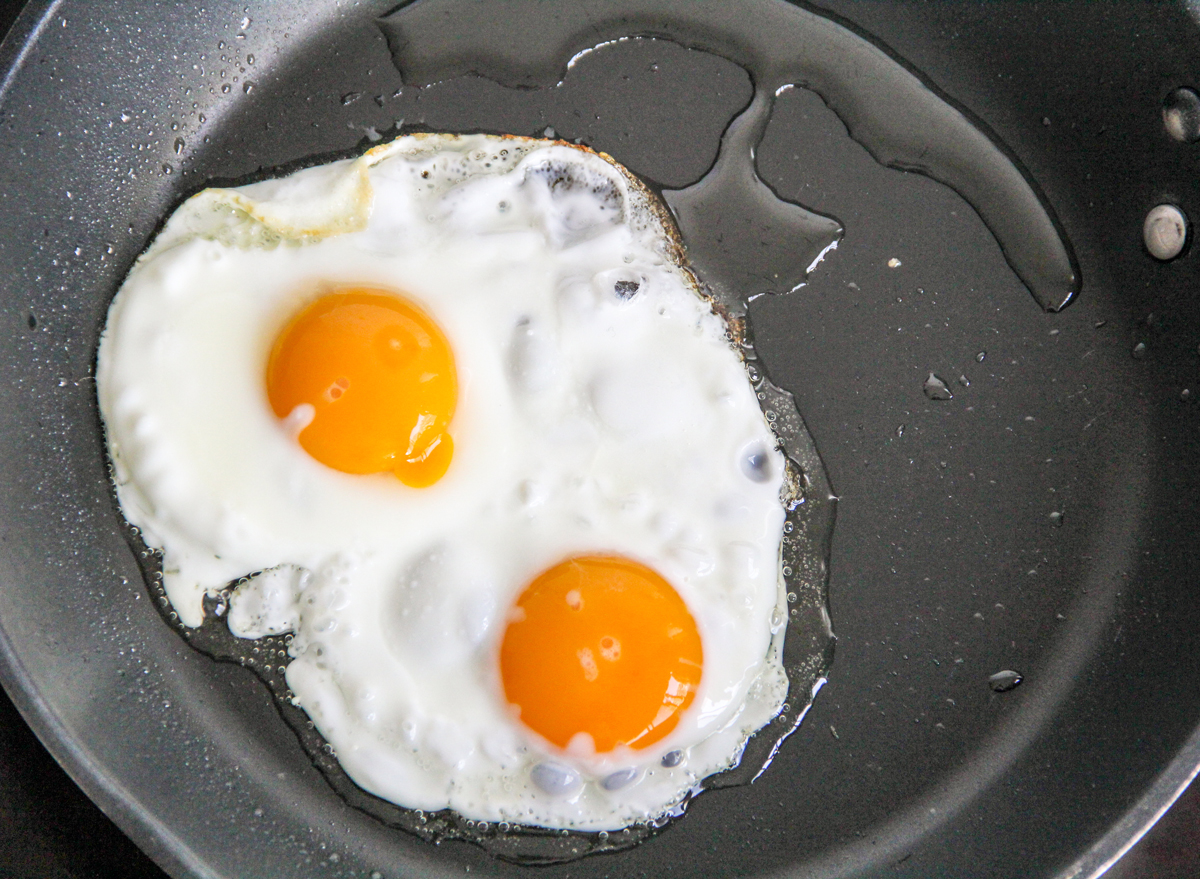Ways Eating Eggs Can Help You Lose Weight, Say Dietitians

As far as weight loss foods go, eggs are one of the best choices you can make. Of course, the most effective way to shed pounds in a healthy way is simply to cut down on the number of calories you’re taking in per day, burn more calories through exercise, or ideally, do a combination of both. But here’s the thing: eggs can help in this regard because they’re ultra-satiating—which means after you eat them, you’ll be less likely to overdo it on the snacking between meals (thus helping you to save calories).
Eggs are incredibly versatile—you can enjoy them at any time of day and in a wide variety of dishes. They also pack a big nutritional bang: In fact, they contain a number of essential nutrients, some of which also play a role in your metabolism. Read on to find out the ways dietitians say eggs can help you lose weight—and don’t miss the 20 Reasons Eggs Could Be Your Secret Weight Loss Weapon.
They’re high in protein.

Eggs are remarkably high in protein—which is the building block of muscle, and muscle tissue burns more calories than fat does.
“Eggs are an excellent food to include in your weight loss plan as they are high in protein to keep you full longer,” says Shena Jaramillo, MS, RD.
One large egg contains 6.3 grams of high-quality vegetarian protein—so if you eat two in one sitting, you’ve already reached 25.2% of your recommended daily intake of 50 grams.
A 2010 study compared the calorie consumption of men who ate an egg-based breakfast to those who ate a bagel and cream cheese breakfast. Remarkably, the egg group consumed a whopping 400 fewer calories in the 24-hour period following breakfast than the bagel group did. Blood tests showed that ghrelin, the hormone that stimulates hunger, was significantly higher after the bagel breakfast.
“Protein positively affects satiety hormones like cholecystokinin, which helps to inhibit gastric emptying thereby keeping us fuller for longer),” says Arika Hoscheit, a clinical registered dietitian with Paloma Health. “Proteins also take longer to digest than carbohydrates because they’re relatively large molecules, which take quite a bit of work to break down into amino acids. High protein foods like eggs help you to feel satisfied for longer periods, making you less likely to reach for unnecessary calories.”
Better yet, Hoscheit says high-protein foods can actually help you torch more calories by stoking your metabolism.
“The thermic effect of food refers to the number of calories needed to digest, transport, absorb, and store it,” she explains. “Protein has the highest thermic effect when compared with carbohydrates and fats. Specifically, the metabolic processes involving proteins require about 20-30% of ingested calories to complete, meaning that eating high protein foods like eggs gives you a good boost in burning more calories and reaching your weight loss goals.”
They’re low in carbs.

If you’re going paleo, keto, or you’re simply trying to lose weight by cutting carbs, eggs should be your new best friend. They contain less than 1 gram of carbohydrates.
“Unlike many traditional breakfast foods like cereal and toast, eggs are rich in protein and free of carbs, which can help promote satiety without spiking insulin levels,” says Diana Gariglio-Clelland, a certified diabetes educator and registered dietitian with Next Luxury. “Carb-based breakfasts like cereals and bread products stimulate the release of insulin from rising blood sugars. Higher levels of insulin can thwart weight loss efforts and lead to more fat storage.”
One 2008 study compared an egg-based breakfast with a bagel-based breakfast and found that eating eggs promoted 65% greater weight loss compared to the carb-heavy alternative.
They’re low in calories.

According to Hoscheit, another reason why eggs are a good choice for weight loss is that they’re relatively low in calories: a large egg only has about 76 calories. That means at breakfast time, you could have two poached eggs and a piece of sprouted whole-grain toast for only 232 calories—which is less than some energy bars (which, it’s also worth mentioning, are typically loaded with sugar and won’t keep you satiated for nearly as long).
They contain some powerful vitamins.

“Eggs are a good source of vitamin D, a fat-soluble vitamin which seems to play a role in weight loss,” says Gariglio-Clelland.
In a 2019 meta-analysis, vitamin D supplementation was found to reduce both BMI and waist circumference in overweight test subjects.
Eggs are also an excellent source of vitamin B12, with .89 micrograms—37% of your DV—in just one.
“Low levels of vitamin B12 are associated with overweight and obesity, whereas vitamin B12 is negatively correlated with body mass index (BMI), meaning higher levels of B12 equates to a lower BMI,” adds Gariglio-Clelland.
Jaramillo notes that eggs are also high in iron, which helps to keep your energy up throughout the day. And if you work out, consider this: 2019 research published in the Journal of Nutrition discovered that iron supplementation improves endurance performance. In other words, the iron that eggs contain could actually fuel you through that grueling run or spin session, thus helping you to burn off more calories.
They can help to balance your blood sugar.

“Eggs can help balance your blood sugar and insulin levels without negatively impacting your blood cholesterol levels,” says Hoscheit.
A 2019 study revealed that eating a low-carb and high-fat meal first thing in the morning (like an omelet) can help you to prevent large blood sugar spikes—which are super common after a high-carb breakfast (like a muffin, or cereal with fruit). Eating this type of breakfast can also improve your glycemic control throughout the day, which is especially important for those with diabetes.
“Keeping your blood sugar levels steady means your energy levels stay stable, and you’re less likely to reach for a mid-afternoon sugary snack to get you through the day,” adds Hoscheit. “Being less dependent on empty calories for energy means fewer calories taken in overall and, hopefully, weight loss.”
Related: Get even more healthy tips straight to your inbox by signing up for our newsletter!